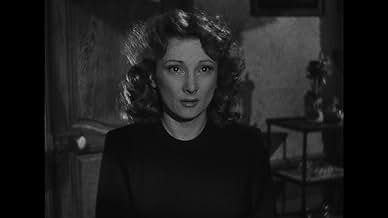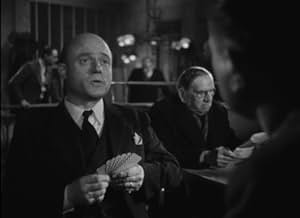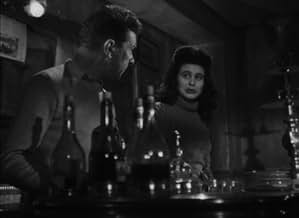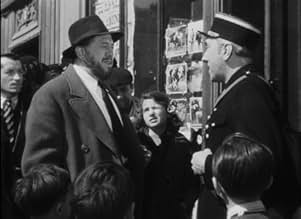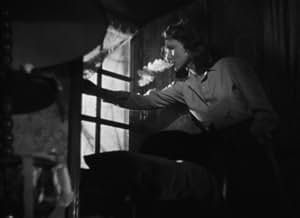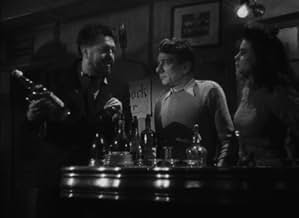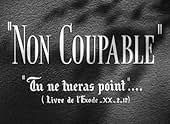Adicionar um enredo no seu idiomaAn alcoholic doctor accidentally kills someone and manages to make the death look like an accident. The episode triggers a sense of confidence and he resolves to correct the miseries of his ... Ler tudoAn alcoholic doctor accidentally kills someone and manages to make the death look like an accident. The episode triggers a sense of confidence and he resolves to correct the miseries of his life.An alcoholic doctor accidentally kills someone and manages to make the death look like an accident. The episode triggers a sense of confidence and he resolves to correct the miseries of his life.
Georges Bréhat
- Aubignac
- (as Georges Brehat)
Henri Charrett
- L'inspecteur Noël
- (as Charrett)
François Joux
- Le lieutenant Louvet
- (as Francois Joux)
Charles Vissières
- L'antiquaire
- (as Vissiere)
Emile Chopitel
- Tournier
- (as Chopitel)
Ariane Murator
- Madame Bastard, la mère de la petite malade
- (as Ariane Muratore)
Jean Sylvère
- Un ami du Docteur Ancelin
- (não creditado)
Avaliações em destaque
From Henry Decoin, here is another of his noir masterpieces, just remember "la Fille du diable", "l'Homme de Londres", "Entre 11 heures et minuit", "Razzia sur la chnouf", "Maléfices" among his best (forgive me if I've forgotten titles). "Non coupable" is one of Michel Simon's best movie, I just can't imagine this movie with another actor, he's so brilliant as a desperate loser trying to be a criminal genius to find a reason of living, the exact opposite of Monsieur Hire in "Panique" (shot one year earlier) who is innocent. In "Non Coupable", like in some movies by Duvivier or Dassin, I just can't see any fine character. Really dark as the cinematography by Jacques Lemare. On location, it was shot around Chartres and as many movies shot in a town, it was first shown there (like "Pontcarral" in Angoulême, "le Loup des Malveneurs" in Aurillac, "Jour de Fête" in Sainte Sévère... ). The script by Marc-Gilbert Sauvajon is perfect. I forget the second happy ending, not really satisfying. Sauvajon also wrote the excellent "Vautrin" for Michel Simon (one of his great double character) and of course worked on "la Fille du Diable".
Michel Simon was a true genius, his presence on screen remains for me the toughest ever.
"Non Coupable" belongs to his most productive period with so many masterpieces ("Vautrin", "Un ami viendra ce soir", "Panique", "la Beauté du Diable", "la Poison", "la Vie d'un honnête homme", and I admire "Un certain Monsieur Jo" in which he's again so impressively tough). In 1947, Michel Simon and Henri Decoin worked together for another forgotten masterpiece, "les Amants du Pont Saint-Jean" (with Jacques Lemare again as cinematographer).
Michel Simon was a true genius, his presence on screen remains for me the toughest ever.
"Non Coupable" belongs to his most productive period with so many masterpieces ("Vautrin", "Un ami viendra ce soir", "Panique", "la Beauté du Diable", "la Poison", "la Vie d'un honnête homme", and I admire "Un certain Monsieur Jo" in which he's again so impressively tough). In 1947, Michel Simon and Henri Decoin worked together for another forgotten masterpiece, "les Amants du Pont Saint-Jean" (with Jacques Lemare again as cinematographer).
With "les inconnus dans la maison" (1942),Henry Decoin, one of the past masters of the French film noir,entered his more fruitful career ;but the trilogy he made before the end of WW2 (which encompass such works as "le bienfaiteur" and "l'homme de Londres ") was not entirely desesperate : some sunshine broke through .
It was no longer that way with "la fille du diable" (1945) ,the ending of which is one of the most pessimistic he ever conceived ;that may explain why "non coupable" has TWO endings :the producers suggested he film another sweetened conclusion* ,like Duvivier reluctantly did for his masterpiece "la belle équipe" (1936);now screened just after the film ,this new denouement brings nothing new and spoils the absolutely noir atmosphere of the movie: probably inspired by Fritz Lang's "woman in the window" (1944), it comes at the most awkward moment.
I suggest the 2021 (soon to be 2022) viewer leave after the director's cut (or turn off his TV set ) for ,as Decoin intended it , it is one of the apex of French film noir and begins where the precedent movie left ; the comparison is not irrelevant :both movies feature an outcast ,Isabelle ,'the Devil's daughter" in the 1945 effort Ancelin in "non coupable" ,a barfly doctor despised by the whole town ,including his colleague ,a smug elegant man who loves to bring him down ;in their scene together ,the words do not cut,they bite.
In both movies ,the press plays a prominent part :the cynical journalist in "non coupable" , Isabelle's cuttings in "la fille du diable".
I dare you to find ONE nice character in "non coupable" ; the crimes may be implausible (one of the main reproaches when the movie was released )but they inspire the director's extremism :based on a Marc -Gilbert Sauvageon 's screenplay ,it depicts the hypocrisy and the wickedness which linger on even when the customers have left the bistro ,leaving the human wreck with the owner and the waitress.
Michel Simon ,one of five greatest actors of the French cinema , gives a superlative performance ,in the part of a man rejected by a whole town (like in Duvivier's masterful "panique"(1945) ). Good support from Jany Holt as his wife and from Jean Wall as honorable doctor Dormont.
. *"les amants sont seuls au monde " (1947) has also another sweetened ending ;producers like happy ends best .
It was no longer that way with "la fille du diable" (1945) ,the ending of which is one of the most pessimistic he ever conceived ;that may explain why "non coupable" has TWO endings :the producers suggested he film another sweetened conclusion* ,like Duvivier reluctantly did for his masterpiece "la belle équipe" (1936);now screened just after the film ,this new denouement brings nothing new and spoils the absolutely noir atmosphere of the movie: probably inspired by Fritz Lang's "woman in the window" (1944), it comes at the most awkward moment.
I suggest the 2021 (soon to be 2022) viewer leave after the director's cut (or turn off his TV set ) for ,as Decoin intended it , it is one of the apex of French film noir and begins where the precedent movie left ; the comparison is not irrelevant :both movies feature an outcast ,Isabelle ,'the Devil's daughter" in the 1945 effort Ancelin in "non coupable" ,a barfly doctor despised by the whole town ,including his colleague ,a smug elegant man who loves to bring him down ;in their scene together ,the words do not cut,they bite.
In both movies ,the press plays a prominent part :the cynical journalist in "non coupable" , Isabelle's cuttings in "la fille du diable".
I dare you to find ONE nice character in "non coupable" ; the crimes may be implausible (one of the main reproaches when the movie was released )but they inspire the director's extremism :based on a Marc -Gilbert Sauvageon 's screenplay ,it depicts the hypocrisy and the wickedness which linger on even when the customers have left the bistro ,leaving the human wreck with the owner and the waitress.
Michel Simon ,one of five greatest actors of the French cinema , gives a superlative performance ,in the part of a man rejected by a whole town (like in Duvivier's masterful "panique"(1945) ). Good support from Jany Holt as his wife and from Jean Wall as honorable doctor Dormont.
. *"les amants sont seuls au monde " (1947) has also another sweetened ending ;producers like happy ends best .
Another movie which i expected it was gonna be good, but it turned out to be even better.
First of all, i don't necessarily agree with some viewers that it's a black comedy. At times, it plays out like that but overall, it is a psychological drama thriller, a tragedy -not in an Ancient Greek sense but more like Edgar Allan Poe maybe. If i had to find something in common with Ancient Greek tragedies, it's the way the protagonist thinks he/she avoided "the spider" (their fate) but with every step they take, they are entangled even more in the web.
Michel Simon is expectedly magnificent, Jany Holt the same. The whole movie feels "fresh", timeless and not dated at all. It's both entertaining and deep. Exciting and intense.
And the ending was great. Even if you can guess where it goes, it's still awe-inspiring.
First of all, i don't necessarily agree with some viewers that it's a black comedy. At times, it plays out like that but overall, it is a psychological drama thriller, a tragedy -not in an Ancient Greek sense but more like Edgar Allan Poe maybe. If i had to find something in common with Ancient Greek tragedies, it's the way the protagonist thinks he/she avoided "the spider" (their fate) but with every step they take, they are entangled even more in the web.
Michel Simon is expectedly magnificent, Jany Holt the same. The whole movie feels "fresh", timeless and not dated at all. It's both entertaining and deep. Exciting and intense.
And the ending was great. Even if you can guess where it goes, it's still awe-inspiring.
This must assuredly be the darkest of Henri Decoin's Film Noirs whilst its bleak and pessimistic tone is matched only by that of Duvivier's masterpiece 'Panique' from the same year.
Both films happen to star Michel Simon whose character in the earlier film is a tragic victim of circumstance whereas here he is the architect of his own downfall.
The screenplay by Marc-Gilbert Sauvajon is full of Gallic irony not least the film's title for although Simon's egomamiacal doctor longs to be found guilty of committing a series of seemingly perfect murders, his buffoonish exterior renders him above suspicion. He is a monstrous creature whose monstrosity is further enhanced by cameraman Jacques Lemare's low-angle shots. The final devastating dénouement represents the ultimate irony and is far more effective than the alternative upbeat ending that Decoin was obliged to shoot.
Excellent performances from Jean Wall as a rival doctor, the always-good-value Jean Debucourt as the investigating detective and Jany Holt as Simon's increasingly terrified mistress. As for Monsieur Simon one simply runs out of superlatives when describing this magnificent artiste whose portrayal here of a vainglorious but pitiable figure adds to his gallery of masterful characterisations.
Upon reading that a proposed remake to be directed by Christopher Gans and starring Albert Dupontel never came to fruition, this viewer could not help but heave a sigh of relief.
Both films happen to star Michel Simon whose character in the earlier film is a tragic victim of circumstance whereas here he is the architect of his own downfall.
The screenplay by Marc-Gilbert Sauvajon is full of Gallic irony not least the film's title for although Simon's egomamiacal doctor longs to be found guilty of committing a series of seemingly perfect murders, his buffoonish exterior renders him above suspicion. He is a monstrous creature whose monstrosity is further enhanced by cameraman Jacques Lemare's low-angle shots. The final devastating dénouement represents the ultimate irony and is far more effective than the alternative upbeat ending that Decoin was obliged to shoot.
Excellent performances from Jean Wall as a rival doctor, the always-good-value Jean Debucourt as the investigating detective and Jany Holt as Simon's increasingly terrified mistress. As for Monsieur Simon one simply runs out of superlatives when describing this magnificent artiste whose portrayal here of a vainglorious but pitiable figure adds to his gallery of masterful characterisations.
Upon reading that a proposed remake to be directed by Christopher Gans and starring Albert Dupontel never came to fruition, this viewer could not help but heave a sigh of relief.
Michel Simon is a drunk doctor with a declining practice. One evening, driving home from a dive bar, he strikes and kills a motorcyclist. Thinking fast and clearly, he makes it look like the motorcyclist had an accident. When he gets away with it, he congratulates himself on his brilliant thinking, and goes back to tending his patients with the best skill he has.
Then he discovers his mistress, Jany Holt, has been cheating on him and selling his gifts to her to give to her lover.
If you want someone to play a pitiable monster, you could not do better than Simon, and that's what director Henri Decoin has done here. He keeps his camera on Simon, surrounds him with intelligible and not particularly memorable characters -- with the exception of Jean Wall, who plays the doctor who is stealing away Simon's practice as a cold, arrogant character -- and lets Simon stand out, as he simultaneously exults in his triumphs and finds despair in the destruction of the ideals he once held.
Then he discovers his mistress, Jany Holt, has been cheating on him and selling his gifts to her to give to her lover.
If you want someone to play a pitiable monster, you could not do better than Simon, and that's what director Henri Decoin has done here. He keeps his camera on Simon, surrounds him with intelligible and not particularly memorable characters -- with the exception of Jean Wall, who plays the doctor who is stealing away Simon's practice as a cold, arrogant character -- and lets Simon stand out, as he simultaneously exults in his triumphs and finds despair in the destruction of the ideals he once held.
Você sabia?
- CuriosidadesThe movie has an alternative ending, which is shown after the restored version of the film.
- Erros de gravaçãoThe crime takes place in a village of "Indre et Loire" (newspaper title). However, the big town around, twice quoted, is Chartres, i.e., in "Eure et Loire".
Principais escolhas
Faça login para avaliar e ver a lista de recomendações personalizadas
Detalhes
- Tempo de duração
- 1 h 35 min(95 min)
- Cor
- Mixagem de som
- Proporção
- 1.37 : 1
Contribua para esta página
Sugerir uma alteração ou adicionar conteúdo ausente

